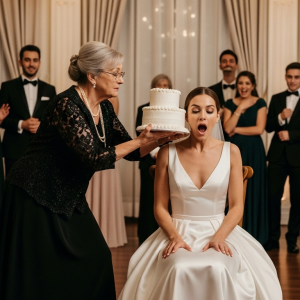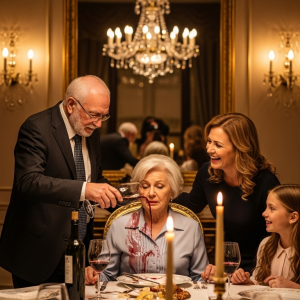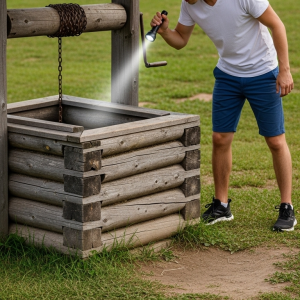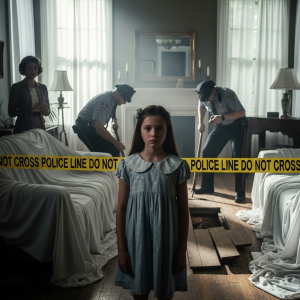They say life gives and it takes away. A cruel, cosmic balance. For me, this wasn’t a philosophical concept; it was the reality of a single, heart-shattering moment. The day my mother’s light faded from this world was the very same day my brother’s first cry pierced it.
Two cries, forever intertwined, crossing paths in the sterile, white silence of a hospital corridor. One, a final, whispered farewell that I barely caught. The other, a raw, powerful scream of new beginnings. A life for a life. A devastating trade I never asked for.
The hours before were a blur of fluorescent lights and the relentless, rhythmic beeping of machines. I remember holding her hand, its warmth slowly retreating, like the tide pulling away from the shore for the last time. Her eyes, the same warm amber as mine, found me through a haze of pain and exhaustion.
“Leo,” she had whispered, her voice a fragile wisp of sound. “Take care of him. Promise me.” Her gaze flickered to the swell of her belly, the home of the little soul we had all been waiting for. I nodded, a lump of unshed tears choking my throat. “I promise, Mom. Always.”
Then, the storm broke. Doctors and nurses rushed in, their voices a muted roar. The steady beep of the heart monitor became a frantic, desperate scream, then fell into a long, deafening silence. In that void, another sound was born—the fierce, demanding cry of a newborn. My brother had arrived.
And my mother was gone.
The nurse, a kind woman with sorrow in her eyes, placed a small, swaddled bundle in my arms. He was so tiny, a fragile collection of new life, his face red and crumpled. He smelled of milk and innocence. As his tiny fist curled around my finger, I didn’t feel joy. I felt the crushing weight of her absence.
Looking down at him, I saw the ghost of her. It was in the curve of his sleeping lips, a faint echo of her gentle smile. It was in the soft tuft of dark hair, just like hers. Life had taken my anchor, my guide, my everything—and in her place, left me this tiny, helpless stranger who was a living, breathing part of her.
Bringing him home was the hardest part. The house, once filled with the scent of her lemon tea and the sound of her humming, was now cavernously silent. Her presence lingered like a phantom limb, an ache in every room. Her favorite armchair sat empty by the window, a book left open on the side table, its page marked.
We named him Theo. It was the name she had chosen. “A gift,” she’d said, smiling as she pressed my hand to her belly a month ago. “A gift from above.” Now, the name felt heavy, ironic.
My aunt Clara came to stay for the first few weeks. She bustled around the house with a forced, fragile cheerfulness, changing diapers, warming bottles, and casting worried glances my way when she thought I wasn’t looking.
“You’re a good boy, Leo,” she’d say, her voice thick with pity. “But this is too much for a twenty-year-old. You should be in college, living your life. Let me help you find a family… a good family for him.”
Each time she said it, a cold fury washed over me. Give him away? This last piece of her? It felt like a betrayal sharper than death itself. “No, Aunt Clara,” I’d answer, my voice low and steady. “I made a promise. He stays with me.”
The nights were the longest. They were a marathon of feedings, changes, and Theo’s inconsolable cries that seemed to echo the hollowness in my own chest. I would walk the floors with him, my body aching with exhaustion, my mind a storm of grief.
In those dark, quiet hours, I would look at his small, perfect face, and I would see her. Her smile, her scent, her warmth. It was both a comfort and a constant, stabbing pain. He would never know the woman whose sacrifice gave him life. He didn’t know that in his small hands, he held the legacy of the greatest love we had ever known.
So I began to talk to him. I would tell him about her.
“Your mother… she loved the rain,” I’d whisper, rocking him gently by the window as a storm raged outside. “She said it was the sky washing the world clean, making everything new again.” I told him how she would sing off-key in the kitchen, how she could make any plant grow, how her laugh could fill a room and make everything feel okay.
I promised her, silently, in the stillness of those nights, that he will never grow up alone. I’ll be the one to watch over his sleep, to hold his hand as he learns to walk, to celebrate his victories and hold him through his tears. Because in his eyes, I saw the part of her that life, in its strange and cruel mercy, had let me keep.
Months bled into a year. The sharp edges of grief began to soften, worn down by the relentless demands of a growing baby. Theo’s first gurgle, his first smile, his first tooth—each milestone was a bittersweet victory. I would capture them on my phone, narrating each video for a mother who would never see them.
“Look, Mom,” I’d whisper to the empty air, filming Theo as he clumsily tried to crawl. “He’s got your determination. He doesn’t give up.” It was a strange, one-sided conversation that kept her spirit alive in the quiet corners of our home.
Our world became small, a universe of two. My friends from college stopped calling as often, their invitations to parties and late-night hangouts fading away. My life was a different rhythm now, dictated by feeding schedules and nap times. Some days, the loneliness was a physical weight.
One afternoon, I found a box in her closet labeled “For Theo.” My hands trembled as I opened it. Inside was a collection of things she had prepared. A hand-knitted blue blanket. A worn copy of her favorite childhood book, “The Velveteen Rabbit.” And a stack of letters, each in a sealed envelope.
The first one was addressed to me.
My Dearest Leo,
If you are reading this, it means I am not there to see my little boy grow. My heart breaks at the thought, but please, do not let your heart break too. You were my first gift, my greatest joy, and my proudest accomplishment. You have a strength in you that you do not yet see, a capacity for love that is boundless.
I know you will be angry. At the world, at fate, perhaps even at me. Feel that anger, my son, but do not let it consume you. Let it burn away until only love is left. Love for your little brother. He is a part of me, a part of us. When you look at him, see me. See my love, living on.
You are not just his brother, Leo. You are his sunrise. You are his guardian. And you will be his hero. I love you more than all the stars in the sky.
Forever, Mom
I collapsed onto the floor, the letter clutched in my hand, and finally let myself sob. It wasn’t the broken, desperate grief of the hospital. It was a cry of release, of understanding, of a terrible and beautiful clarity. This wasn’t just a burden I was carrying. It was an honor. It was the final, most important task she had ever given me.
Theo was eighteen months old when the fever hit. It started small, a warmth to his skin, but by nightfall, it had become a raging fire. He was listless, his cries weak and pained. The digital thermometer blinked a terrifying red: 40°C ($104^{\circ}$F).
Panic, cold and sharp, seized me. I bundled him into his car seat, my hands shaking so badly I could barely buckle the straps. The drive to the emergency room was a nightmare. Every red light felt like an eternity. Theo’s shallow breaths from the back seat were the only sound, a fragile rhythm against the frantic beating of my own heart.
The hospital was the same one. The same sterile smell, the same harsh fluorescent lights. The memories came rushing back, a tidal wave of trauma. I felt like that twenty-year-old boy again, helpless and terrified in the face of loss.
They took him from my arms and whisked him away. I was left alone in a waiting room, the air thick with antiseptic and quiet desperation. The clock on the wall ticked with agonizing slowness. Was this it? Was this how the universe balanced the scales again? By taking the one thing I had left?
I buried my head in my hands, a prayer, a plea, a desperate bargain forming on my lips. “Please,” I whispered to the memory of my mother. “Don’t take him. I can’t do this without him. I’m not strong enough. I’m not you.”
Hours crawled by. A doctor finally appeared, his face tired but calm. “Leo?” he asked. I shot to my feet.
“He’s responding to the medication,” the doctor said, and the world came rushing back into focus. “The fever is coming down. It was a severe infection, but he’s a little fighter. You brought him in at just the right time.”
Relief washed over me so intensely my knees went weak. They let me see him. He was asleep in a small crib, an IV drip in his tiny hand, but his breathing was even and his skin was no longer flushed with that terrifying heat. I gently touched his cheek. It was cool.
I stayed in that chair by his crib all night, never taking my eyes off him. I watched the steady rise and fall of his small chest, a sight more beautiful than any sunrise. And as the first light of dawn streamed through the window, painting the room in soft hues of grey and pink, I understood.
My mother’s strength wasn’t some magical force she possessed. It was born of love. A fierce, protective, unconditional love that gave her the power to endure pain, to fight fear, and to put another’s life before her own. And that love did not die with her. She had planted its seed in me. It was there when I refused to give Theo away. It was there during the sleepless nights. And it was there tonight, when panic had propelled me to act, to save him.
Some nights, I can almost imagine her laughter filling the room, her voice whispering, “See, my son? I told you it would all be okay.” And that vision, that feeling, gives me the strength to keep going, to face another day.
So tonight, as I write this, with Theo sleeping soundly in his own bed back home, this is not just a story. It is a renewal of a promise. A vow etched not in stone, but on the very fabric of my soul.
Her light will continue to guide us from the stars above. And my brother, my Theo, this precious gift, will always know, without a shadow of a doubt, that he is loved more than words can say.
He is loved twice as much: by me here, on this earth, and by the angel who watches over us from heaven.
Of course. Let us continue Leo and Theo’s journey. The story now moves from the immediate aftermath of grief into the challenges of memory, legacy, and explaining the unexplainable to a child.
Two more years passed, painting over the raw canvas of our grief with the vibrant, chaotic colors of a toddler’s life. Theo, now a whirlwind of four, was no longer a fragile baby but a small person with a fiercely independent spirit and a universe of questions in his wide, amber eyes. My world, once defined by loss, was now defined by small shoes to tie, scraped knees to kiss, and a constant chorus of “Why?”
Our days found a new rhythm, a comfortable dance of preschool drop-offs, trips to the park, and building magnificent Lego castles that would inevitably be destroyed by a tiny, giggling Godzilla. I was no longer just a grieving brother; I was the keeper of snacks, the monster-under-the-bed checker, the chief storyteller. I was his everything.
One bright, sun-drenched afternoon, we were at the playground. Theo was scrambling up the slide, his laughter the brightest sound in the world. I sat on a nearby bench, watching him, a familiar, gentle ache in my chest. He looked so much like her when he smiled, a pure, unreserved joy that lit up his whole face.
A little boy named Ben, a friend from preschool, tumbled down the slide after Theo. His mother, a kind woman named Sarah, sat down on the bench next to me. “They have so much energy,” she said with a warm smile. “I wish I could bottle it up.”
“Tell me about it,” I laughed. “I think he runs on some kind of secret nuclear fusion.”
We watched our boys play, a comfortable silence settling between us. Then, Ben tripped and scraped his knee. His face crumpled, and he ran wailing to his mother. “Mommy!” Sarah swept him up into a hug, kissing his knee, whispering reassurances until his tears subsided.
I saw Theo stop at the top of the slide, watching them. He was quiet, his head tilted. He wasn’t sad, just… observant. He was processing. I knew, with a sudden, cold certainty, that a question was forming, a question I had been dreading for years.
Later that evening, as I was tucking him into bed, he looked up at me, his favorite stuffed bear clutched in his arms. “Leo,” he began, his voice small and serious. “Ben has a mommy. Where is my mommy?”
The question landed in the quiet room with the force of a physical blow. I had rehearsed this moment in my head a thousand times, but every practiced word vanished. All I had was the trusting face of my little brother, looking to me for an answer that I didn’t know how to give.
I sat down on the edge of his bed, my heart hammering against my ribs. I couldn’t lie to him. And I couldn’t burden his small shoulders with the brutal truth of a hospital room. I had to give him something else. Something true in a different way.
“You do have a mommy, Theo,” I said softly, my voice steadier than I felt. “You have the best one.”
His eyes widened. “Where is she?”
I took a deep breath and led him to the window, pulling back the curtains. The night sky was a deep, velvety blue, sprinkled with a handful of early stars. “Look out there,” I whispered, pointing up. “Do you see the brightest star? The one that seems to be twinkling right at you?”
He pressed his face against the cool glass, his breath fogging a small circle. “I see it! It’s sparkling!”
“That’s her,” I said, the words feeling truer than I ever expected. “That’s your mommy. Her love for you was so big and so bright that when her body got too tired to stay, all that love went up into the sky to become a star. So she could watch over you. Always.”
He stared, mesmerized. “She’s a star?”
“The brightest one,” I confirmed, my throat tight. “And she watches over us every single night.”
Theo was quiet for a long moment, his small mind working to grasp this new reality. I could see the gears turning. He wasn’t sad; he was intrigued. His mother wasn’t gone; she was just… somewhere else. Somewhere high and bright.
“Can I talk to her?” he asked, his voice full of wonder.
A lump formed in my throat. He needed more than a story; he needed a connection. An idea, born from the desperation to make her real for him, sparked in my mind. “We can do better than that,” I said, a new energy coursing through me. “We can send her messages.”
The next day, we found the perfect container: a large, clear glass jar. We also bought a pack of colored paper and a pair of child-safe scissors. I explained the plan to Theo as we sat on the living room floor, surrounded by art supplies.
“This,” I announced, holding up the empty container, “is our Star Jar. And every time we miss Mommy, or when you do something brave at school, or when you just want to tell her about your day, we will make a star.”
I showed him how to fold the paper and make a small, puffy star. His little fingers were clumsy, but his brow was furrowed in concentration. Our first star was a lopsided, crumpled yellow thing, but it was perfect.
“What should we tell her on this one?” I asked.
He thought for a moment, then whispered, “Tell her I miss her.”
I wrote the words on a tiny slip of paper before we folded it inside the star. We miss you. We dropped it into the jar, and the sound of it clinking against the glass was like a small bell ringing in the quiet house. A new ritual had begun.
The Star Jar became the center of our little universe. A green star went in when Theo finally learned to ride his bike without training wheels (“Mom, he was so brave!”). A blue one went in on his fifth birthday. A rainbow-colored one, scribbled with his own crayon drawing, went in just because.
Some nights, he would simply hold the jar, shaking it gently, watching the collection of colorful messages tumble over each other. He was holding our love. He was holding our memories. The jar wasn’t a symbol of our loss; it was an archive of our continuing love for her.
It didn’t erase the ache of her absence, especially on days like Mother’s Day, when the world seemed to celebrate something we couldn’t have. But it gave us a way to channel our feelings, to make her a living, breathing part of our daily lives.
One evening, I found Theo standing on his bed, peering out the window into the night sky. He wasn’t talking. He was just looking up at the brightest star with a small, contented smile on his face. He knew he was being watched over. He knew he was loved.
And in that moment, I felt my mother’s presence more strongly than ever before. Not as a ghost or a whisper, but as a warmth that radiated from the little boy before me and from the growing galaxy of paper stars resting on his bedside table. We were going to be okay. Her boys were going to be okay.




